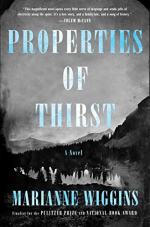|
This section contains 727 words (approx. 2 pages at 400 words per page) |

|
Properties of Thirst Summary & Study Guide Description
Properties of Thirst Summary & Study Guide includes comprehensive information and analysis to help you understand the book. This study guide contains the following sections:
This detailed literature summary also contains Quotes and a Free Quiz on Properties of Thirst by Marianne Wiggins.
The following version of this book was used to create the guide: Wiggins, Marianne. Properties of Thirst. Simon & Schuster, 2022.
Properties of Thirst by Marianne Wiggins is a novel written in the third person about the Rhodes family and federal workers during World War II. Much of the story is told in the present tense starting just as Pearl Harbor is bombed, but there are frequent flashbacks to earlier times in the lives of the characters. It is set in Owens Valley in California.
The main family of the novel is the Rhodes family. Rocky, the patriarch, owns a ranch in Owens Valley, California. He built the main house, described as a mansion, to please Lou, the woman who agreed to marry him and move to the land once the house was built. He got his significant amount of money from his father who was wealthy. This money helps to pay for the ranch over the years.
Rocky spends much of his time fighting the Los Angeles Department of Water because the department is siphoning water from under his property to provide for the people and businesses of Los Angeles. In fact, he loses two fingers trying to blow up an aqueduct. He is unsuccessful in his fight, and after his death, his property is sold to the Department of Water.
The story of Sunny Rhodes, Rocky’s daughter, is of central importance to the story. She is the twin sister of Stryker who has just died at Pearl Harbor as the story begins. She originally is in love with a man named Jesus and plans to marry him, but he meets someone else and leaves Sunny after having to live in exile due to his involvement in a crime. Her loyalty had already been in question, as she did not flee with him to Mexico when he was forced to leave the country. She is a cook and owns Lou’s Diner which she named after her deceased mother. She is moved by the plight of the people at the Japanese internment camp that juts up against their property and helps them in numerous ways.
The story of Schiff intertwines with those of the Rhodes family. At the beginning of the novel, he works for the Department of the Interior, and his job is to oversee the implementation and running of the Japanese internment camp at Manzanar. The camp implementation does not run smoothly, and he feels guilty for this. He also feels guilt over having a comfortable and safe job while other men his age are at war. He sees the moral and constitutional errors in what the government is doing by overriding Habeas Corpus and detaining American people of Japanese descent.
Eventually he does enlist in the military because he wants to fight Hitler. He realizes, however, that he will be sent to Japan because he knows some Japanese and has experience working with Japanese people. He is kept safe by the military during the war because they want him to write Japan’s new constitution when the war is over. He does this, and after he leaves the military, he heads back to California to be with Sunny.
The last main character in the novel is Cas, Sunny’s aunt and Rocky’s twin sister. She has given up her life to help raise Rocky’s children after Lou dies. She is protective of the children because she does not ever want Rocky to suffer again as much as he did when Lou died. She is a harpist, and her skills at the harp are what ultimately get the attention of Lyndon Finn. The two become a couple although they decide not to marry but stay together forever nevertheless.
Wiggins is able to expand upon numerous themes by detailing the stories of these fictional characters. One of these main themes centers around whether people can ultimately save what they love. The characters are adamant that people cannot save that which they do not love. The injustice of what occurs at the internment camps for Japanese Americans is also of primary importance as is the ways that history imposes on individual lives. Finally, Wiggins explores how family ties are built and broken between generations and pays particular attention to the ways in which the written word hinders and strengthens these bonds.
Read more from the Study Guide
|
This section contains 727 words (approx. 2 pages at 400 words per page) |

|



